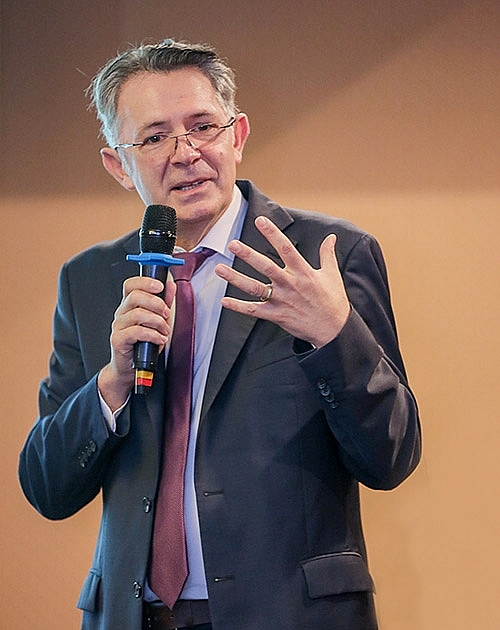CFM International finds potential market in Vietnam’s aviation industry
 |
| President and CEO Gaël Méheust |
CFM has long been a trusted partner for Vietnamese carriers. Can you elaborate on this close partnership and the services you provide?
We are proud to be the world’s leading manufacturer of commercial aircraft engines, including our long-term collaborations with various airlines in Vietnam. Earlier this year, we signed a memorandum of understanding with budget carrier Vietjet, who has been a buyer of our engines since 2011. We also work with the upcoming Bamboo Airways and previously with the flag carrier Vietnam Airlines.
Our partnership with airlines, including those in this country, is a long-term one because our customers can operate the engine for a decade or longer. We have a range of support contracts that are tailored to every customer, and we want to develop the best value proposal for airlines. We’re constantly finding new ideas to help improve operating efficiency.
Although our product offers are the same for all airlines, CFM stands out from the rest by catering our services to each individual customer. For example, Vietjet chose the rate-per-flight hour package, which means the airline pays for our maintenance and support services based on the number of flight hours. Other customers may opt for the shop-visit method, in which airlines are charged by the number of visits that their planes make to our maintenance centres.
What does the future of Vietnam’s aviation industry look like in your opinion? Are you gravitating towards low-cost airlines?
The Vietnamese aviation industry is poised for strong growth, and the number of air passengers is expected to triple between now and 2030. As more people fly, airlines are likely to expand their fleet and that is good news for high-quality engine makers like CFM. That’s a huge growth opportunity for us in Vietnam, and also why we’re eager to partner with airlines here.
We see a successful future for different kinds of carriers. Regarding our relationship with Vietnam Airlines, we remain hopeful of the airline’s expected growth.
This time, I came to Hanoi to check on our customers and see if they’re enjoying our services. There’s no new signing yet, but we always look forward to future partnerships with Vietnamese customers.
The LEAP engine programme by CFM recently celebrated its tenth anniversary. What are the secrets to the worldwide adoption of this aviation technology?
In 2008, the LEAP programme was a bold move for GE and Safran Aircraft Engines, who together run CFM International in a 50/50 joint venture. They committed to a multi-billion-dollar engine development programme that, at the time, did not have an airplane application. But our parent companies were so confident in CFM that they renewed the partnership agreement to the year 2040.
For the past ten years, their confidence has paid off. LEAP engines by CFM had powered more than 1.5 million flights and flew more than 2.5 million hours for more than 80 airlines worldwide. Our engine has also shown exceptional reliability, with LEAP customers operating the engine up to 11 flights a day, with many of them executing 25-minute gate turn times.
At the same time, LEAP is delivering on the promised 15 per cent improvement in fuel consumption and CO2 emissions, along with considerable reductions in engine noise and exhaust gaseous emissions.
Our long-term technology investment strategy has proven to be greatly beneficial for customers around the world. We have designed an engine that has met every one of our commitments and we are incredibly proud of this accomplishment. But even more important than that, our customers love this engine, and that is the true measure of our success.
We attribute our resounding success to the use of advanced and light-weight materials. Most of the materials at CFM were the first of their kind in the industry, changing the way aviation looks at jet propulsion and laying a solid technology pathway for the future engine developments.
All this technology is focused on providing better utilisation, including CFM’s superior reliability out of the box; greater asset availability; enhanced time on wing margins to help keep our maintenance costs low; and minimised maintenance actions. This is supported by sophisticated analytics that enable CFM to provide tailored and predictive maintenance over the life of the product.
What the stars mean:
★ Poor ★ ★ Promising ★★★ Good ★★★★ Very good ★★★★★ Exceptional
Related Contents
Latest News
More News
- The next leap in Cloud AI (December 11, 2025 | 18:19)
- Vietnam’s telecom industry: the next stage of growth (December 11, 2025 | 18:18)
- Five tech predictions for 2026 and beyond: new era of AI (December 11, 2025 | 18:16)
- CONINCO announces new chairman and CEO (December 10, 2025 | 11:00)
- How AWS is powering the next-gen data era (December 09, 2025 | 13:14)
- Outlook in M&A solid for Singapore (December 08, 2025 | 10:31)
- Vietnamese firms are resetting their strategy for global markets (December 05, 2025 | 17:04)
- LPBank Securities accelerates AI and data innovation with AWS (December 05, 2025 | 09:00)
- Improving traceability capacity with Zebra Technologies (November 26, 2025 | 10:08)
- Ho Chi Minh City engages 500 CEOs in dialogue on building global megacity (November 25, 2025 | 16:00)

 Tag:
Tag:
















 Mobile Version
Mobile Version